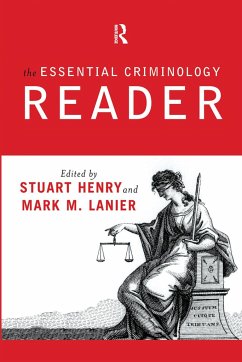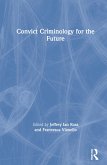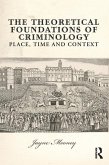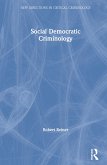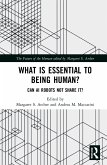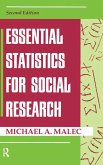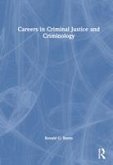Stuart Henry
The Essential Criminology Reader
Stuart Henry
The Essential Criminology Reader
- Gebundenes Buch
- Merkliste
- Auf die Merkliste
- Bewerten Bewerten
- Teilen
- Produkt teilen
- Produkterinnerung
- Produkterinnerung
Initially designed to accompany Mark Lanier and Stuart Henry's best-selling Essential Criminology textbook, this new reader is an up-to-date companion text perfect for all students of introductory criminology and criminological theory courses.
Andere Kunden interessierten sich auch für
![Noticing: An Essential Reader (1973-2023) Noticing: An Essential Reader (1973-2023)]() Steve SailerNoticing: An Essential Reader (1973-2023)278,99 €
Steve SailerNoticing: An Essential Reader (1973-2023)278,99 €![Convict Criminology for the Future Convict Criminology for the Future]() Convict Criminology for the Future168,99 €
Convict Criminology for the Future168,99 €![The Theoretical Foundations of Criminology The Theoretical Foundations of Criminology]() Jayne MooneyThe Theoretical Foundations of Criminology169,99 €
Jayne MooneyThe Theoretical Foundations of Criminology169,99 €![Social Democratic Criminology Social Democratic Criminology]() Robert ReinerSocial Democratic Criminology167,99 €
Robert ReinerSocial Democratic Criminology167,99 €![What is Essential to Being Human? What is Essential to Being Human?]() What is Essential to Being Human?167,99 €
What is Essential to Being Human?167,99 €![Essential Statistics For Social Research Essential Statistics For Social Research]() Michael MalecEssential Statistics For Social Research171,99 €
Michael MalecEssential Statistics For Social Research171,99 €![Careers in Criminal Justice and Criminology Careers in Criminal Justice and Criminology]() Ronald G. BurnsCareers in Criminal Justice and Criminology148,99 €
Ronald G. BurnsCareers in Criminal Justice and Criminology148,99 €-
-
-
Initially designed to accompany Mark Lanier and Stuart Henry's best-selling Essential Criminology textbook, this new reader is an up-to-date companion text perfect for all students of introductory criminology and criminological theory courses.
Produktdetails
- Produktdetails
- Verlag: Routledge
- Seitenzahl: 396
- Erscheinungstermin: 13. Juni 2019
- Englisch
- Abmessung: 240mm x 161mm x 26mm
- Gewicht: 757g
- ISBN-13: 9780367096878
- ISBN-10: 0367096870
- Artikelnr.: 57383037
- Herstellerkennzeichnung
- Libri GmbH
- Europaallee 1
- 36244 Bad Hersfeld
- gpsr@libri.de
- Verlag: Routledge
- Seitenzahl: 396
- Erscheinungstermin: 13. Juni 2019
- Englisch
- Abmessung: 240mm x 161mm x 26mm
- Gewicht: 757g
- ISBN-13: 9780367096878
- ISBN-10: 0367096870
- Artikelnr.: 57383037
- Herstellerkennzeichnung
- Libri GmbH
- Europaallee 1
- 36244 Bad Hersfeld
- gpsr@libri.de
Stuart Henry
1. Classical and Rational Choice Theories * 1.1 Free Will and Determinism?
Reading Beccarias Of Crimes and Punishments (1764) as a Text of
Enlightenment, by Piers Beirne * 1.2 Rational and Situational Choice
Theory, by Derek B Cornish and Ronald V. Clarke 2. Biological and Biosocial
Theories * 2.1 Cesare Lombroso and the Origins of Criminology: Rethinking
Criminological Tradition, by Nicole Rafter * 2.2 Integrating Findings from
Neurobiology into Criminological Thought: Issues, Solutions, and
Implications, by Diana Fishbein 3. Psychological Theories * 3.1 Forty Years
of the Yochelson/Samenow Work: A Perspective, by Stanton E. Samenow * 3.2
Contributions of Community Psychology to Criminal Justice: Prevention
Research and Intervention, by Sarah Livsey and William S. Davidson II 4.
Social Learning and Neutralization Theories * 4.1 Social Learning Theory:
Correcting Misconceptions, by Christine S. Sellers and Ronald L. Akers *
4.2 Techniques of Neutralization, by W. William Minor 5. Social Control
Theories * 5.1 Social Control and Self-Control Theory, by Travis Hirschi
and Michael Gottfredson * 5.2 Social Control Theory and Direct Parental
Controls, by Joseph H. Rankin and L. Edward Wells 6. Social Ecology and
Subcultural Theories * 6.1 Social Ecology and Collective Efficacy Theory,
by Robert J. Sampson * 6.2 Gangs as Social Actors, by John M. Hagedorn 7.
Anomie and Strain Theories * 7.1 General Strain Theory, by Robert Agnew *
7.2 The Origins, Nature, and Prospects of Institutional-Anomie Theory, by
Richard Rosenfeld and Steven F. Messner * 7.3 Global Anomie Theory, by
Nikos Passas 8. Conflict and Radical Theories * 8.1 Criminology and
Conflict Theory, by Austin T. Turk * 8.2 The New Radical Criminology and
the Same Old Criticisms, by Michael J. Lynch and Paul B. Stretesky 9.
Feminist and Gender Theories * 9.1 Feminist Thinking About Crime, by
Kathleen Daly * 9.2 Masculinities and Theoretical Criminology, by James W.
Messerschmidt 10. Postmodernist and Critical Cultur
Reading Beccarias Of Crimes and Punishments (1764) as a Text of
Enlightenment, by Piers Beirne * 1.2 Rational and Situational Choice
Theory, by Derek B Cornish and Ronald V. Clarke 2. Biological and Biosocial
Theories * 2.1 Cesare Lombroso and the Origins of Criminology: Rethinking
Criminological Tradition, by Nicole Rafter * 2.2 Integrating Findings from
Neurobiology into Criminological Thought: Issues, Solutions, and
Implications, by Diana Fishbein 3. Psychological Theories * 3.1 Forty Years
of the Yochelson/Samenow Work: A Perspective, by Stanton E. Samenow * 3.2
Contributions of Community Psychology to Criminal Justice: Prevention
Research and Intervention, by Sarah Livsey and William S. Davidson II 4.
Social Learning and Neutralization Theories * 4.1 Social Learning Theory:
Correcting Misconceptions, by Christine S. Sellers and Ronald L. Akers *
4.2 Techniques of Neutralization, by W. William Minor 5. Social Control
Theories * 5.1 Social Control and Self-Control Theory, by Travis Hirschi
and Michael Gottfredson * 5.2 Social Control Theory and Direct Parental
Controls, by Joseph H. Rankin and L. Edward Wells 6. Social Ecology and
Subcultural Theories * 6.1 Social Ecology and Collective Efficacy Theory,
by Robert J. Sampson * 6.2 Gangs as Social Actors, by John M. Hagedorn 7.
Anomie and Strain Theories * 7.1 General Strain Theory, by Robert Agnew *
7.2 The Origins, Nature, and Prospects of Institutional-Anomie Theory, by
Richard Rosenfeld and Steven F. Messner * 7.3 Global Anomie Theory, by
Nikos Passas 8. Conflict and Radical Theories * 8.1 Criminology and
Conflict Theory, by Austin T. Turk * 8.2 The New Radical Criminology and
the Same Old Criticisms, by Michael J. Lynch and Paul B. Stretesky 9.
Feminist and Gender Theories * 9.1 Feminist Thinking About Crime, by
Kathleen Daly * 9.2 Masculinities and Theoretical Criminology, by James W.
Messerschmidt 10. Postmodernist and Critical Cultur
1. Classical and Rational Choice Theories * 1.1 Free Will and Determinism?
Reading Beccarias Of Crimes and Punishments (1764) as a Text of
Enlightenment, by Piers Beirne * 1.2 Rational and Situational Choice
Theory, by Derek B Cornish and Ronald V. Clarke 2. Biological and Biosocial
Theories * 2.1 Cesare Lombroso and the Origins of Criminology: Rethinking
Criminological Tradition, by Nicole Rafter * 2.2 Integrating Findings from
Neurobiology into Criminological Thought: Issues, Solutions, and
Implications, by Diana Fishbein 3. Psychological Theories * 3.1 Forty Years
of the Yochelson/Samenow Work: A Perspective, by Stanton E. Samenow * 3.2
Contributions of Community Psychology to Criminal Justice: Prevention
Research and Intervention, by Sarah Livsey and William S. Davidson II 4.
Social Learning and Neutralization Theories * 4.1 Social Learning Theory:
Correcting Misconceptions, by Christine S. Sellers and Ronald L. Akers *
4.2 Techniques of Neutralization, by W. William Minor 5. Social Control
Theories * 5.1 Social Control and Self-Control Theory, by Travis Hirschi
and Michael Gottfredson * 5.2 Social Control Theory and Direct Parental
Controls, by Joseph H. Rankin and L. Edward Wells 6. Social Ecology and
Subcultural Theories * 6.1 Social Ecology and Collective Efficacy Theory,
by Robert J. Sampson * 6.2 Gangs as Social Actors, by John M. Hagedorn 7.
Anomie and Strain Theories * 7.1 General Strain Theory, by Robert Agnew *
7.2 The Origins, Nature, and Prospects of Institutional-Anomie Theory, by
Richard Rosenfeld and Steven F. Messner * 7.3 Global Anomie Theory, by
Nikos Passas 8. Conflict and Radical Theories * 8.1 Criminology and
Conflict Theory, by Austin T. Turk * 8.2 The New Radical Criminology and
the Same Old Criticisms, by Michael J. Lynch and Paul B. Stretesky 9.
Feminist and Gender Theories * 9.1 Feminist Thinking About Crime, by
Kathleen Daly * 9.2 Masculinities and Theoretical Criminology, by James W.
Messerschmidt 10. Postmodernist and Critical Cultur
Reading Beccarias Of Crimes and Punishments (1764) as a Text of
Enlightenment, by Piers Beirne * 1.2 Rational and Situational Choice
Theory, by Derek B Cornish and Ronald V. Clarke 2. Biological and Biosocial
Theories * 2.1 Cesare Lombroso and the Origins of Criminology: Rethinking
Criminological Tradition, by Nicole Rafter * 2.2 Integrating Findings from
Neurobiology into Criminological Thought: Issues, Solutions, and
Implications, by Diana Fishbein 3. Psychological Theories * 3.1 Forty Years
of the Yochelson/Samenow Work: A Perspective, by Stanton E. Samenow * 3.2
Contributions of Community Psychology to Criminal Justice: Prevention
Research and Intervention, by Sarah Livsey and William S. Davidson II 4.
Social Learning and Neutralization Theories * 4.1 Social Learning Theory:
Correcting Misconceptions, by Christine S. Sellers and Ronald L. Akers *
4.2 Techniques of Neutralization, by W. William Minor 5. Social Control
Theories * 5.1 Social Control and Self-Control Theory, by Travis Hirschi
and Michael Gottfredson * 5.2 Social Control Theory and Direct Parental
Controls, by Joseph H. Rankin and L. Edward Wells 6. Social Ecology and
Subcultural Theories * 6.1 Social Ecology and Collective Efficacy Theory,
by Robert J. Sampson * 6.2 Gangs as Social Actors, by John M. Hagedorn 7.
Anomie and Strain Theories * 7.1 General Strain Theory, by Robert Agnew *
7.2 The Origins, Nature, and Prospects of Institutional-Anomie Theory, by
Richard Rosenfeld and Steven F. Messner * 7.3 Global Anomie Theory, by
Nikos Passas 8. Conflict and Radical Theories * 8.1 Criminology and
Conflict Theory, by Austin T. Turk * 8.2 The New Radical Criminology and
the Same Old Criticisms, by Michael J. Lynch and Paul B. Stretesky 9.
Feminist and Gender Theories * 9.1 Feminist Thinking About Crime, by
Kathleen Daly * 9.2 Masculinities and Theoretical Criminology, by James W.
Messerschmidt 10. Postmodernist and Critical Cultur

